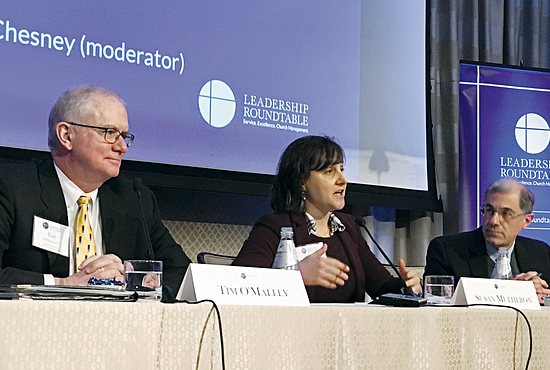
Permanent solutions to the Church’s sexual abuse crisis are going to require a greater level of lay participation and more legal muscle.
These were among conclusions discussed at a news conference following the Leadership Roundtable’s Catholic Partnership Summit Feb. 1-2.
The summit, which included three cardinals, university and college presidents and canon lawyers representing 43 dioceses, is expected to issue a document with recommendations in a couple of weeks.
Participants during the summit included two officials with the Archdiocese of St. Paul and Minneapolis: Tim O’Malley, director of Ministerial Standards and Safe Environment, and Susan Mulheron, chancellor for Canonical Affairs.
A key term at the summit was “emerging best practices” for identifying abusers and bringing them to justice. A reputation developed by the archdiocese for paving the way in best practices was a key reason O’Malley and Mulheron were asked to participate on a panel Feb. 2 that included moderator Kathleen McChesney, a former FBI agent and former head of what is now the U.S. Bishops’ Secretariat for Child and Youth Protection.
Some of the participants in the summit spoke to the press in a teleconference afterward.
There are “twin crises,” of leadership and sexual abuse, McChesney said.
“Survivors have been telling us for 15 years that there are two crises,” she said.
Bishop Shawn McKnight of Jefferson City, Missouri, said, “We as bishops have to respect the need for the laity to be involved, and in principle, the whole Church is going to have to be utilized in resolving the twin crises. As one person put it, I think so eloquently, ‘If all we have is miters and collars around the table, we won’t get anywhere. Where are the mothers and fathers?’”
Key to any solution is transparency, and the largest element of that is for dioceses to release “the names of those credibly accused,” Bishop McKnight said.
He also called for a “cultural mindset conversion as well as specific norms and processes. We need to commit to having a good study, a foundational research to understand the root causes of the problem that we’re in.”
“People without influence and without connections need to be a part of this,” said John Carr, director of the Initiative on Catholic Social Thought and Public Life at Georgetown University.
“The Church should be speaking up effectively and credibly on behalf of the vulnerable, whether it’s unborn children, whether it’s children taken away from their mothers at the border, whether it’s the poor,” he said. “And one of the real tragedies to the crisis is, that voice has been undermined and can be marginalized.”
Ahead of the Catholic Partnership Summit, which was not open to media coverage, the Leadership Roundtable said the event’s focus on the abuse crisis included looking at the impact of the crisis on “the youngest generation of Catholics.”
“Leadership Roundtable believes that Catholic leaders, lay and ordained, must create a new culture of leadership and management that is transparent, accountable, competent and grounded in best practices in order to provide justice to survivors and credibly lead the Church into the future,” it said in a statement.
Among the co-hosts of the event were Chicago Cardinal Blase Cupich, Boston Cardinal Sean O’Malley and Cardinal Joseph Tobin of Newark, New Jersey.



